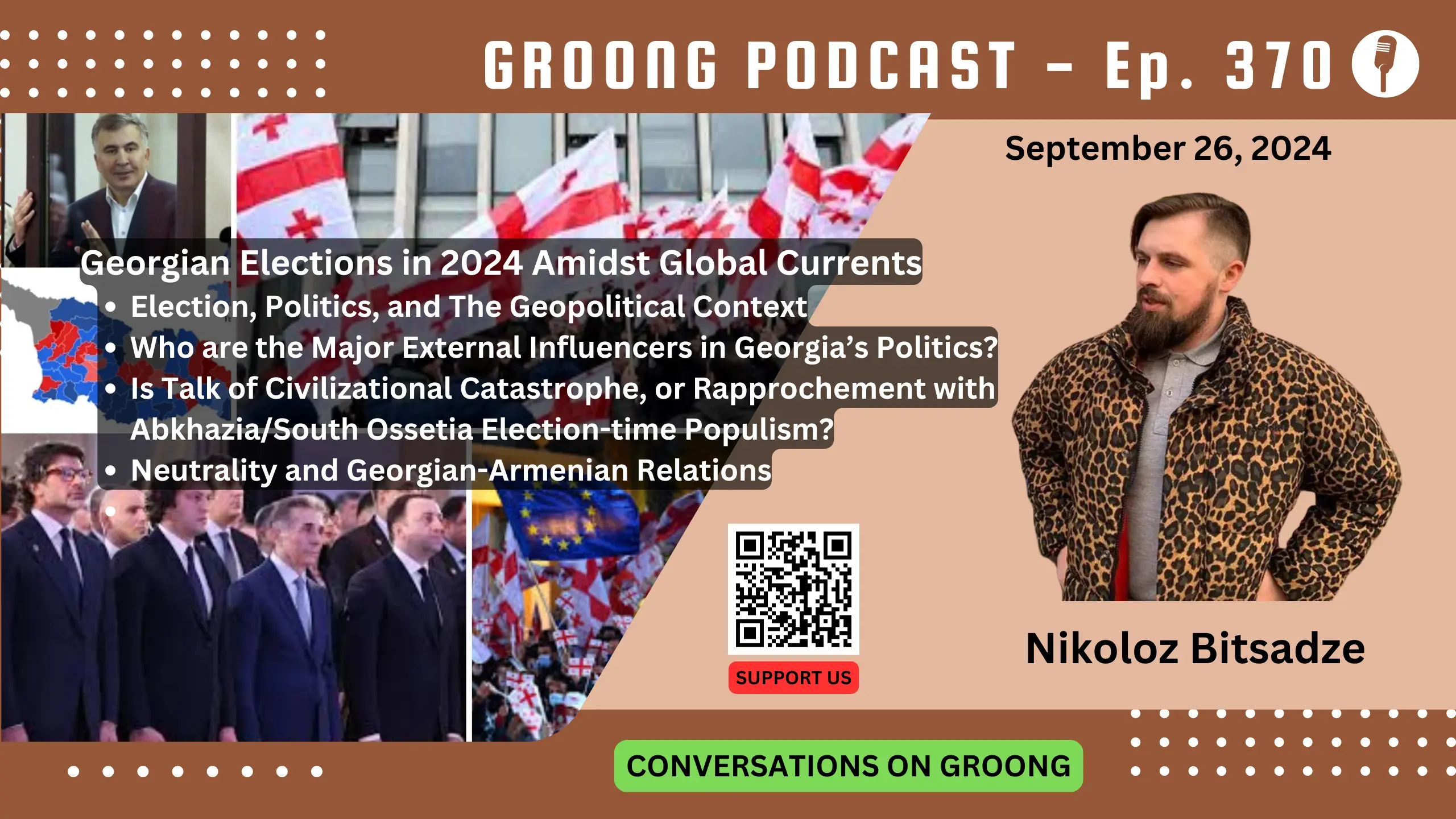
Groong Links:
Guest:
Topics:
- Election, Politics, and The Geopolitical Context
- Who are the Major External Influencers in Georgia’s Politics?
- Is Talk of Civilizational Catastrophe, or Rapprochement with Abkhazia/South Ossetia Election-time Populism?
- Neutrality and Georgian-Armenian Relations
Episode 370 | Recorded: September 21, 2024
Show Notes
Georgian Elections in 2024 Amidst Global Currents
Election and Politics
Georgia’s parliamentary elections are set for October 26, and political tensions are rising. The ruling Georgian Dream party has clashed with the West, with the EU pausing Georgia’s candidacy for membership, and both the US and EU imposing sanctions on its party leaders. This rift began with the “Transparency of Foreign Influence” law and other conservative legislative initiatives. Georgia’s refusal to support certain anti-Russian measures during the Ukraine war has also strained relations. Georgian Dream appears to have doubled down on its stance, naming Bidzina Ivanishvili, Irakli Kobakhidze, and Irakli Gharibashvili as lead candidates.
UNM To Be Banned?
Finally, a month ago Georgian Dream published a post stating that if they achieve “constitutional majority”, then they will initiate a “legal process” as a result of which Saakashvili’s UNM party and its satellites would be declared unconstitutional, or illegal.
Despite the strong language, recent polls indicate that GD is unlikely to get a constitutional majority.
Questions:
- Why does Georgian Dream want to outlaw the UNM, and what legal mechanism would allow this?
- How do voters react to GD’s radical statements, and is it likely they’ll achieve a constitutional majority?
Polls
A month ago the GORBI polls showed support for GD at 59.3, while the leading opposition Unity Alliance (that includes UNM) would get 13.1%.
Meanwhile, a more recent poll from Edison Research, puts GD at 32.3% while the Unity Alliance would get 20%.
Questions:
- What’s your sense of the current popular mood in Georgia?
- Is Tbilisi the most important hub for the elections? What about Azeri populated Marneuli, and Armenian populated Javakheti?
- How do these polls lean? Is any one of them trustworthy alone, and in an absolute sense?
The Geopolitical Context
The Georgian elections are being framed as an existential battle, either a chance to pivot to the west or reject the west. If voters endorse Georgian Dream’s approach and conservative policies they could effectively put the country’s EU aspirations on hold indefinitely.
Question:
- How important are these elections in Georgia, and why?
Western politicians are not mincing any words. Earlier this month MPs from Germany traveled to Georgia to support the opposition and gave GD a stern warning that the “Foreign Agent Law” must be abolished or EU membership will remain blocked.
Questions:
- Why has the “Foreign Agent Law” become such a major issue for the West, and what’s at stake for Georgia, and also for the West?
- How true are Western claims that Georgia is aligning with Russian interests, and are Turkey and China players in Georgian politics?
Apologies to Abkhazia and South Ossetia
One of the more fascinating stories from last week came from Ivanishvili, who put out the idea of apologizing to the people of Abkhazia and South Ossetia. They put the blame on Mikheil Saakashvili’s government in 2008.
On the other side of the 2008 conflict, Russia has apparently suspended social aid to Abkhazia, this is also interesting.
Questions:
- Is it out of the realm of possibilities to think that Georgia and Russia may reconcile their differences around Abkhazia and S. Ossetia?
- How likely is this, or is this election-time populism, or demagoguery?
- Armenia is highly interested in the reopening of the Abkhaz railway. Do you see this railway returning to service, should Russia and Georgia find a solution to the territorial issues?
Potential for Post-Election Turmoil
Many are predicting a high chance that the next government of Georgia may not be decided at the polling stations because regardless of the results, there is so much polarization that one side or the other might take to the streets.
Questions:
- Will the opposition accept the results, if the CEC announces a GD victory?
- Could there be post-election violence and potential for non-electoral regime change?
Georgian-Armenian Relations
Modern relations between Georgia and Armenia are by and large cordial but generally not particularly warm.
We know that for Georgia, Turkey is an important ally and neighbor. One of the foreign-policy red lines for Turkey, however, is denial of the genocide it perpetrated against Armenians in 1915. When we were talking with another Georgian colleague, they mentioned that Georgia has to be careful in its foreign policy related to issues such as the 1915 Genocide due to relations with Turkey. For Armenians, the issue of the Armenian Genocide is a “load bearing” truth, a core part of our identity and is accepted by a vast majority of scholars as historical truth.
Questions:
- Why aren’t relations between the two countries cordial but not warm?
- What is needed for Armenians and Georgians, neighbors after all who don’t have a major history of animosity, to achieve solidarity and unity on issues of historic truth?
Wrap-up
That’s our show! We hope you found it useful. Please find us on Social Media and follow us everywhere you get your Armenian news.
Thanks to Laura Osborn for the music on our podcasts.
Guests

Nikoloz Bitsadze
Dr. Nikoloz Bitsadze is a researcher at The Center for International Politics Research and Forecasting (CIPRF), with a PhD in politics and international relations from Tbilisi State University.
Hosts

Hovik Manucharyan
Hovik Manucharyan is an information security engineer who moved from Seattle to Armenia in 2022. He co-founded the ANN/Groong podcast in 2020 and has been a contributor to Groong News since the late 1990s.
Disclaimer: The views expressed by Hovik Manucharyan on the ANN/Groong podcast are his own and do not necessarily reflect the opinions of his employer or any other organization.

Asbed Bedrossian
Asbed Bedrossian is an IT professional, and for years oversaw the central IT enterprise infrastructure and services at USC. His decades of experience spanned across IT strategy, enterprise architecture, infrastructure, cybersecurity, enterprise applications, data center operations, high performance computing, ITSM, ITPM, and more.
Asbed founded the Armenian News Network Groong circa 1989/1990, and co-founded the ANN/Groong podcast in 2020.